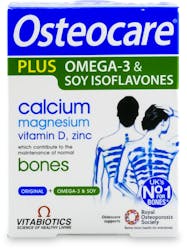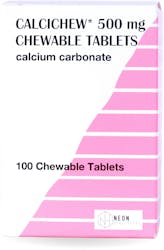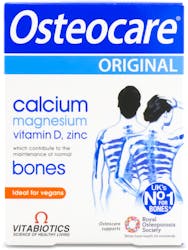Accrete D3 60 Film-Coated Tablets
Accrete D3 60 Film-Coated Tablets
What 500,000+ customers say about medino:
Get notified when back in stock
Description
Accrete D3 60 Film-Coated Tablets combine calcium and vitamin D to support bone health. Adults and the elderly often need extra calcium and vitamin D, especially those at risk of deficiency. This supplement is recommended for those with low calcium and vitamin D or those receiving osteoporosis treatment. These nutrients are essential for strong bones and teeth. Customers should know it is not suitable for children or those with severe kidney issues.
Key Features:
- High calcium content: Each tablet provides 600 mg calcium from calcium carbonate.
- Essential vitamin D: Contains 10 micrograms colecalciferol (vitamin D3).
- Easy to swallow: Film-coated tablets are gentle on the stomach and simple to take.
- Support for osteoporosis: Ideal as an adjunct to prescribed osteoporosis treatments.
- Convenient dosage: One tablet twice daily with food, or as directed by a doctor.
Who should use Accrete D3 60 Film-Coated Tablets?
Adults and the elderly who may not get enough calcium or vitamin D from their diet benefit most. People undergoing osteoporosis treatment or those at risk of deficiency should consider this supplement. It is not intended for children or those with severe kidney problems. Always consult a doctor before starting if you have existing health concerns.
What makes Accrete D3 different from other calcium supplements?
Accrete D3 combines both calcium and vitamin D in one tablet for convenience. The film coating makes it easier to swallow and may improve absorption. It is specifically formulated for adults and the elderly at risk of deficiency.
Is Accrete D3 suitable for vegetarians or vegans?
Accrete D3 tablets contain gelatin and soya oil, so they are not suitable for vegans. Vegetarians should check with their doctor before use, as gelatin is an animal product.
What are Accrete D3 60 Film-Coated Tablets used for?
Accrete D3 60 Film-Coated Tablets are used to prevent and treat calcium and vitamin D deficiency, especially in adults and the elderly. They help support healthy bones and teeth, and are often recommended as an adjunct to osteoporosis treatments.
Are there any dietary considerations when taking Accrete D3?
Certain foods, such as spinach, sorrel, rhubarb, and whole cereals, can reduce calcium absorption. Wait at least two hours after eating these foods before taking your tablet for best results.
Is Accrete D3 suitable for vegetarians or vegans?
Accrete D3 contains gelatin and soya oil, so it is not suitable for vegans. Vegetarians should check with their doctor before use, as gelatin is an animal product.
Ingredients
The active substances: Colecalciferol 400IU (equivalent to 10 micrograms) and calcium 600 mg (as calcium carbonate 1500 mg) in each film-coated tablet.
The other ingredients:
Tablet core: magnesium stearate, crospovidone (Type A), copovidone (K-value: 25.2-30.8), microcrystalline cellulose, sucrose, gelatin, all-rac-a-tocopherol (E307), hydrogenated soya-bean oil, maize starch.
Coating: yellow iron oxide (E172), hypromellose (15 mPa s), titanium dioxide (E171), macrogol 3350, talc.
Usage and Instructions
The recommended dose for adults and the elderly is one film-coated tablet 2 times per day (e.g. one tablet in the morning and one tablet in the evening).
It is recommended to take the film-coated tablet within one and a half hours of a meal with a glass of water or juice, without chewing it. The tablet can be broken in half, if needed.
Warnings
If you take Accrete D3 tablets for a prolonged period of time serum calcium levels should be followed and renal function should be monitored (by checking serum creatinine levels). Monitoring is especially important in:
- patients aged 65+ on concomitant treatment with cardiac glycosides or diuretics
- in patients with a high tendency to calculus formation.
Vitamin D should be used with caution in patients with impairment of renal function and the effect on calcium and phosphate levels should be monitored. The risk of soft tissue calcification should be taken into account. In patients with severe renal insufficiency, vitamin D in the form of colecalciferol is not metabolised normally and other forms of vitamin D should be used.
Accrete D3 film-coated tablets should be prescribed with caution to patients suffering from sarcoidosis, due to the risk of increased metabolism of vitamin D into its active form. These patients should be monitored with regard to the calcium content in serum and urine.
Accrete D3 film-coated tablets should be used with caution in immobilised patients with osteoporosis due to increased risk of hypercalcaemia.
If you are taking other supplements containing Vitamin D, please check with your pharmacist or doctor before taking Accrete-D3.
This medication should be used during pregnancy and breastfeeding only if recommended by a doctor. During pregnancy, the daily dose should not exceed 1500mg of calcium and 600IU of vitamin.
Interactions with other medications, supplements or food:
- Calcium salts can decrease the absorption of iron, zinc or strontium. Take iron, zinc or strontium preparations at a distance of two hours from the calcium preparation.
- Oxalic acid (found in spinach, sorrel and rhubarb) and phytic acid (found in whole cereals) may inhibit calcium absorption through the formation of insoluble compounds with calcium ions. The patient should not take calcium products within two hours of eating foods high in oxalic acid and phytic acid.







